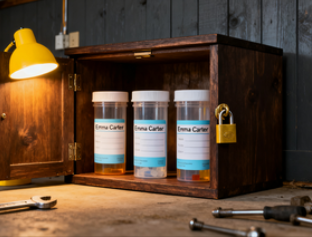
The locked cabinet in the garage was one of those household mysteries you’d learned to ignore. Tucked between the lawn fertilizer and the Christmas decorations, its small brass padlock was a quiet, unassuming boundary. Your partner had always waved it off. “Just some old paint cans and pesticides I don’t want the kids getting into,” they’d say. It made sense, and you’d never had a reason to question it.
The discovery happened on a rainy Saturday. A pipe burst in the wall behind the cabinet, and in the frantic rush to move everything before the water damage spread, the locked cabinet was knocked over. The flimsy hasp splintered away from the rotting wood, and the door swung open.
You expected paint cans. Instead, you saw a neat, sobering collection of prescription medication bottles. Dozens of them. All prescribed to someone named “Eleanor Grayson.” The dates on the labels were recent. The medications had names you vaguely recognized from television commercials—powerful drugs for managing chronic pain, for battling aggressive cancers, for staving off the relentless progression of late-stage multiple sclerosis.
Your blood ran cold. Eleanor Grayson. The name was a complete stranger’s. But the evidence was undeniable, chilling in its intimacy. Your partner was hiding someone’s serious, debilitating illness in the garage. Was it a secret family member? A second, hidden life with a sick lover? The cabinet felt less like a storage locker and more like a tomb, holding the chemical evidence of a profound betrayal.
When your partner came home, you didn’t say a word. You simply led them to the garage and pointed at the open cabinet, the small, orange bottles spilling out onto the damp concrete.
They didn’t look guilty. They looked… devastated. As if a fortress they had built with painstaking care had finally been breached.
“Eleanor Grayson was my mother,” they whispered, their voice cracking on the last word.
You were stunned. “Your mother’s name was Anne. We visited her grave last May.”
“That was my stepmother,” they said, sinking onto an old stool. “Eleanor was my birth mother. She… she didn’t die when I was a baby. She left.”
The story that tumbled out was one of shame and heartbreak, a story from a time when certain illnesses carried a social stigma. Eleanor Grayson had been diagnosed with a severe, degenerative form of multiple sclerosis when your partner was just a child. The prognosis was grim, the treatments experimental and expensive. Their father, unable to cope, had told everyone she had died. He’d remarried a woman named Anne, who became the only mother they ever knew. Eleanor was placed in a long-term care facility, her existence a closely guarded family secret.
“A year ago, I found her,” your partner said, tears finally falling. “She’s in a state facility two hours from here. She’s… she’s still there. She never had anyone else. I’ve been using my bonus money to get her the better medications, the ones the state won’t cover. I pick them up and… and I keep them here. Sometimes I crush them and mix them into a smoothie when I go to see her, because she can’t swallow pills anymore.”
The locked cabinet in the garage held medication bottles prescribed to someone named Eleanor Grayson because Eleanor Grayson was the ghost of the mother they were never allowed to mourn, and were now desperately, secretly, trying to comfort. It wasn’t a secret of infidelity, but of fidelity—a heartbreaking loyalty to a woman the world had forgotten, a private atonement for a lie they were forced to live as a child. The pills weren’t evidence of a double life; they were the fragile, chemical tether holding a broken family together across decades of silence and shame. In that moment, you didn’t see a liar. You saw a saint, tending to a ghost in the only way they knew how, their love so vast it had to be locked away in the dark, safe from the judgment of the world.